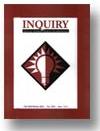Relationship Between Critical Thinking and Decision Making
In the corporate environment critical decisions must be made, sometimes quickly, whether because of changes in market conditions, corporate profits, or corporate performances. The decision-making process is vital to good management in today's work environment. This paper will examine the relationship between critical thinking and the decision making process, explain what the textbook authors believe, and relate how both apply to today's workplace.
Critical thinking involves the ability to weigh evidence, examine arguments, and construct rational bases for generally accepted beliefs. In order to establish a theoretical basis for studying critical thinking, a great quantity of research has been done. Critical thinking is not only the ability to reason and construct arguments, but also the ability to examine the reasoning processes involved and being able to evaluate their appropriateness and effectiveness. This "judgment" aspect is what makes critical thinking more than just problem solving.
It is not sufficient to be able to apply problem-solving strategies to a particular problem; a true critical thinker must be able to choose appropriate strategies and even create new ones when necessary.
In dealing with most complex problems in today's work environment, there may be more than one good answer to a problem. The question then becomes one of picking the best answer; this is called decision-making. Weighing the consequences of these possible solutions based on our understanding of their potential outcomes is the job of the manager. A good manager does not distinguish between "critical thinking" and "decision-making" when working. He uses both to arrive at a solution. It is only when analyzing how to come to a specific decision that he must employ critical thinking skills so that he does not allow personal prejudices, emotions, or stress to affect his thinking processes.
According to the authors...


